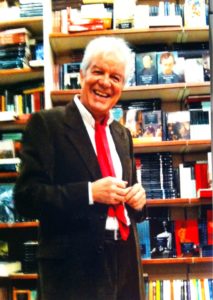My science, My philosophy
The so-called science – quantum physics, entanglement, mathematics, spacetime – for what concerns the base and the meaning of the universe, cannot help us. It is only a mental artifice, an Everest of artificial symbols and thoughts… Our interest, in this field, is associated with “the most reliable facts”. The lack of these is the lack of a true dialogue both with the universe and among ourselves.
 The science that Immanuel Kant called, not synthetic knowledge, but analytical knowledge, is also my science. In fact, it is precisely what I apply in the construction of the cosmic evolution. In other words, synthetic science has to do with facts, experience, empirical studies, etc.; analytical science has to do with logical, reasoning, concepts, etc. It is important to emphasize that synthetic knowledge can change over time, but this doesn’t happen with analytical knowledge: man is mortal, synthetic knowledge; nothingness of the nothingness is immortal, analytical knowledge.
The science that Immanuel Kant called, not synthetic knowledge, but analytical knowledge, is also my science. In fact, it is precisely what I apply in the construction of the cosmic evolution. In other words, synthetic science has to do with facts, experience, empirical studies, etc.; analytical science has to do with logical, reasoning, concepts, etc. It is important to emphasize that synthetic knowledge can change over time, but this doesn’t happen with analytical knowledge: man is mortal, synthetic knowledge; nothingness of the nothingness is immortal, analytical knowledge.
In this sense, my science is a science that goes beyond ordinary science. Ordinary scientists are “the laborers of science”, without wanting to offend them. They, with some exceptions, don’t go beyond the microscope and telescope. Moreover, they belong to the System and, therefore, aren’t free thinkers. Kantian analytical science, begins right here, beyond the microscope and telescope, particularly when we are talking about nothingness of nothingness and the history of the universe.
With nothingness of nothingness we mean something where a physical identity doesn’t exist. To understand this elusive phenomenon, one must apply Kantian synthetic and analytical judgments, such as induction and deduction, physical and metaphysical knowledge, etc. The latter, for Kant, belongs to the a priori analytical judgments, that is the judgments of rationalism, those that go beyond physics and synthetic science, and here, when one goes beyond physics and synthetic science, is no more the territory of common science, it is the territory of metaphysical science: uncommon knowledge.
The Kantian philosopher proceeds on certain topics, particularly on the universe, as paleontologists do: in a logical and scientific way. Unfortunately, not with physical, demonstrable facts. These, to the Kantian philosopher, are missing. What I mean is this. For paleontologists it is enough to get hold of only one piece of evidence – a limb, a bone, a skull – of the missing animal or whatever it is, and once they have got hold of this limb, they are able to reconstruct the whole body. The Kantian philosopher cannot do the same thing with the start of the universe as paleontologists do. He has no artifacts from the first part of the universe, no evidence, he has nothing from this period of its existence. He must start from nothingness of nothingness and from here to the arrival of the proto-element, the first particle.
The thesis that most shook the waters in the Eighteenth century was that of the philosopher of Königsberg, Immanuel Kant, 1724-1804. Before him, the philosophers Descartes, Leibniz, Spinoza and others, argued that God came first and then God created man. Kant proved the opposite: “First, he says, comes man and then man invents and creates God”. It is the man who speaks of God, it is the man who describes God, it is the man who has given him all the attributes and all the names we know, so it is not God who speaks of man, but it is man who speaks of God. This is Kant’s thesis. All what has been written and said about God after this Kantian statement, has been said, written and invented by man. God is an invention of man, a creation of man, an image of man. In short, God is a fiction and nothing more.
In his “Critique of Pure Reason”, Kant writes: “Now I argue that all attempts at a purely speculative use of reason in relation to theology are radically fruitless, and, by their very nature, EMPTY and VAN” ( capital letters are mine), p. 470.
After Kant, no other self-respecting philosopher or scientist dared to contradict his thesis. Indeed, both, science and philosophy, have supported and strengthened it to the point that today any person with a reasonable brain knows how things stand.
The copyright of this article “My science and my philosophy” is mine, thank you.

Thank you for permitting your work to be read. It’s a great endeavor to be able to verbalize this. I think that you have validated the midnight thoughts I have had and you are the only person who was brave enough to express yourself. We, as who we are, spend so much time naming everything and fear to acknowledge what we really are. Not a one of us ever thinks that we are accumulations of errant molecules that exist, yet don’t exist. You blew my mind. I’m neither a philosopher nor a scientist, but I’m always asking questions and trying to look beyond what I see, what I feel and what I’m really looking at. Gloriously speechless.